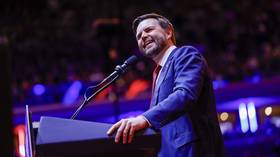The former president wants the US to play no role in guaranteeing peace between Moscow and Kiev, according to one of his advisers
Donald Trump will leave the enforcement of any peace deal between Russia and Ukraine to European powers, one of the former US president’s advisers has told the Financial Times. The plan is one of several floated by Trump’s advisers and allies, all of which involve the US refusing to deal with the aftermath of the conflict.
Trump has promised to bring a rapid end to the ongoing conflict if he is elected president in November. However, he has offered few specifics as to how he would do this, save for pressing Vladimir Putin and Vladimir Zelensky into peace talks with US aid to Kiev as leverage.
In the absence of any concrete peace plan, a host of Trump’s current and former advisers have outlined how they think the former president could achieve this goal.
One unnamed “long-term Trump adviser” told the Financial Times on Monday that the Republican candidate could resolve the conflict with “a reimagining of the failed Minsk agreements of 2014 and 2015,” under which Kiev agreed to grant some autonomy to the majority Russian-speaking regions of Donetsk and Lugansk.
This time around, the adviser said, the deal would be enforced by EU peacekeepers. “There are two things America will insist on,” he said. “We will not have any men or women in the enforcement mechanism. We’re not paying for it. Europe is paying for it.”
Reviving the Minsk agreements would likely present several major challenges. After multiple European leaders admitted that they never intended to abide by the 2014 and 2015 agreements, Moscow does not believe that the EU can play the role of honest broker, Russian Foreign Minister Sergey Lavrov said earlier this month.
Furthermore, Donetsk and Lugansk – along with Kherson and Zaporozhye – have since joined the Russian Federation, and any peace deal must take into account this “territorial reality,” the Kremlin has said.
Fred Fleitz, a former CIA analyst who served in Trump’s White House, told the British newspaper that the US could “freeze the conflict” along the current front line, and negotiate a lasting settlement with Russia at a later date. Ukraine would not give up its territorial claims in the meantime, Fleitz said, explaining that this plan counts on delaying a final agreement until “Putin leaves the stage.”
However, Fleitz conceded that he does not speak for Trump and does not know the former president’s foreign policy plans.
The most detailed proposal has been put forward by Trump’s running mate, Ohio Senator J.D. Vance. Speaking to former US Navy SEAL and podcast host Shawn Ryan last month, Vance said that the current frontline could be demilitarized and fortified, ensuring that “Russia doesn’t invade again.” In exchange, “Russia gets a guarantee of neutrality from Ukraine,” while Germany and other EU countries foot the bill for Ukraine’s reconstruction. The current American policy of “throw[ing] money at this problem, [and] hope[ing] the Ukrainians are able to achieve a military victory” is “stupid,” Vance told Ryan.



